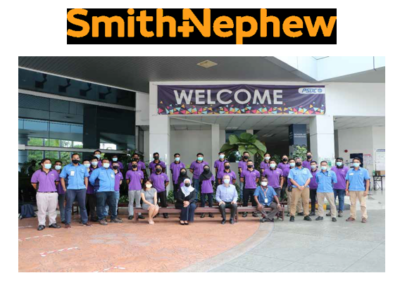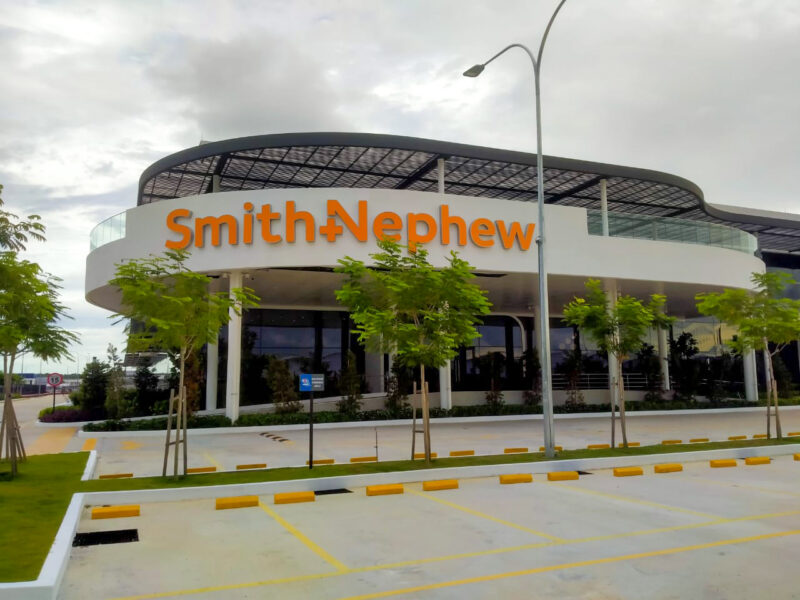Medical giant’s Penang plant hits ESG goals four years ahead of schedule

This site
is mobile
responsive

British multinational company Smith+Nephew has long been known as a medical equipment manufacturing company, having been established in Hull, UK in 1856. With a presence in more than 100 countries, the company is focused on helping to restore people’s bodies and their self-belief by using technology to take the limits off living, as attested by its corporate motto: “Life Unlimited”.
Smith+Nephew aims to make a positive difference to patients’ lives through its innovative product portfolio, as well as the invention and application of new medical technologies. In Orthopeadics its products are used to mend broken bones and replace worn or damaged hip and knee joints, in
Sports Medicine & ENT its technologies are used to repair soft tissue injuries, and in Advanced Wound Management its products treat hard to heal and chronic wounds.
In recognising Asia Pacific as a high growth region, the company decided to establish a manufacturing facility in Penang as part of its strategic decision to ensure a close proximity to its customers. Construction of the 250,000 square feet plant began in early 2020, where it is expected to ship its first production batches for Orthopaedic products before the end of 2022.
Zero waste goal achieved with zero time wasted
Since the completion of the construction, the Smith+Nephew Penang manufacturing plant has achieved the goal of Zero Waste-to-Landfill, whereby all waste produced are diverted from landfill disposal four years ahead of its corporate sustainability target. This is part of its effort to continually explore opportunities to create positive impacts to benefit the planet, the communities in which it operates in, and the products it produces. Among the targets it hopes to achieve are 100 per cent renewable electricity by the end of 2022, and Net Zero Carbon Emissions by 2045.
Achieving such an important goal at such speed was the result of Smith+Nephew’s appointment of a local Environment, Social and Governance (ESG) team to develop a strategy and framework. Not only did the team achieve multiple objectives, including identifying waste streams, waste minimisation (refuse and reduce), and waste management (waste recycling, recovery, and waste-to-energy). It partnered with a local integrated waste management facility, allowing it to access the latest technologies and eco-friendly solutions to achieve sustainable waste management.
In December 2021, the United Nations Global Compact Network Malaysia and Brunei recognised Smith+Nephew Penang for being the first manufacturing company in Malaysia to achieve this ambitious goal. Smith+Nephew Penang’s Managing Director, Mr. Mark Arthun attended the ceremony in Kuala Lumpur to receive the award in the category of SDG Benchmark 4: Zero Waste to Landfill and Incineration.
Caring for the Communities
The Smith+Nephew team is also taking the lead in sustainability and community activities by encouraging more industry players to act and commit to net zero carbon emission goals. Last year, they facilitated “Malaysia’s Climate Action Week: Race to Net Zero Supply Chains”, which was organised by the British Malaysian Chamber of Commerce, and the British High Commission. The team also received an AMCHAM CARES award from the American Malaysian Chamber of Commerce (AMCHAM) for “Excellence in Corporate Social Responsibility (CSR)” for creating long term economic and social values between business operations and society.
In a more direct show of caring for these communities, the Smith+Nephew team also financially sponsored students from the Penang Skills Development Centre to be employed as trainee machinists upon graduation while contributing to the development of Science, Technology, Engineering, and Mathematics (STEM) via the Penang Science Cluster with sponsorship arrangements in science fairs for primary and secondary students.
Additionally, in recognising the devastating impacts of the flood in Grik, Kedah and the COVID-19
pandemic, the team collaborated with charities, including Moment of PEACE and The Hope Branch to help affected families with pre-loved clothes and food bags.
Arthun who is also the Site Leader for Smith+Nephew Penang commented: “I am so proud of our team and especially our ESG team for their care, passion and dedication. They have worked tirelessly to achieve zero waste-to-landfill years ahead of schedule, and have always been quick to help our communities in need. We continue to explore new opportunities and collaborations to contribute to society while minimising our impacts on the environment.”
Life Unlimited and the Three Cs: Care, Collaboration, and Courage
Smith+Nephew’s sustainability strategy is built on its purpose of Life Unlimited, its strategic imperatives, and its culture pillars of Care, Collaboration and Courage. For this globe-spanning industry leader, Life Unlimited extends to the communities where its employees live and work. Smith+Nephew says it demonstrates Care by respecting its global resources, minimising its impact on the environment, and ensuring the safety and wellbeing of all its employees.
Collaboration is achieved through a culture of teamwork based on mutual trust and respect; through transparent and respectful communication, and through the encouragement of different perspectives and leveraging of its global experiences to achieve the best outcomes.
Finally, Courage is demonstrated by the company setting ambitious goals to increase its volunteerism, reduce waste and CO2 emissions, as well as minimising its ecological footprint by operating responsibly and sustainably, so much so that in 2021, the company is committed to becoming net zero by 2045.
With a clear goal to minimise its waste streams at all of its sites around the world, and especially at its manufacturing locations, Smith+Nephew aims for best practices in waste management, where emphasis is placed on waste generated in-house and downstream, and throughout the life cycle of its products. This spans the raw materials purchased, the waste generated in its manufacturing facilities, and the final destination of its products, with the company continuously identifying and implementing waste reduction measures at source through reuse and recycling opportunities, and finding ways to divert waste from landfill.
Smith+Nephew’s 2021 growth has not had a material impact on its environmental footprint for waste. In fact, its total waste generated was two per cent lower than the previous year. In 2021, 79 per cent of the company’s total waste was recycled, including waste diverted to energy recovery. This is in line with its aim to exceed 80 per cent recycling, where it is vigilantly looking for opportunities to eliminate landfill waste at key manufacturing locations (with the Penang manufacturing site being one of the first).
More information about Smith+Nephew’s Sustainability Approach, please visit www.smith-nephew.com/sustainability.
